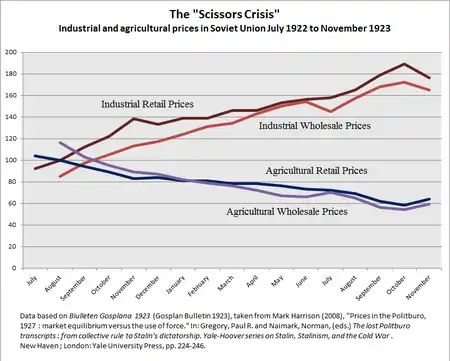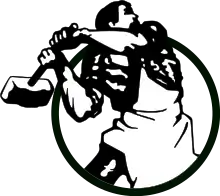Workers' Truth
Worker's Truth (Rabochaya Pravda) was Russian socialist opposition group which was founded in 1921. They published Rabochaya Pravda, an eponymous newspaper, which first appeared in September 1921.

| Part of a series on |
| Left communism |
|---|
 |
|
Their programmatic statement (the "Appeal/Message to the revolutionary proletariat and all the revolutionary elements who remained faithful to the struggling working class")[1] appeared in the Berlin-based Menshevik journal Sotsialisticheskii Vestnik in January 1922.
They argued that during the First World War "military-state capitalism" had accelerated the tendency towards centralisation of economic management and had given rise to a new bourgeois class composed of the more effective elements of the old bourgeoisie, with new elements drawn from the technical organising intelligentsia. They claimed that although the Russian Communist Party had been the party of the working class, it had become "the party or the organisers and directors of the governmental apparatus and economic life along capitalistic lines." To combat this they proposed forming secret propaganda circles in the work place, in the trade unions and other workers organisations as well as within the Communist Party and its affiliates.[2]
By August 1923 a wave of strikes spread across Russian industrial centres, sparked off by the Scissor crisis.[3] On 8 September 1923 a number of arrests were made by the Soviet secret police in connection with Workers' Truth, including Alexander Bogdanov. He denied any organisational involvement with them, although they had claimed that they were inspired by his views. He demanded a personal interview with Felix Dzerzhinsky and spoke with him twice before being released on 13 October.
In December 1923 Fanya Samoilova Shutskever, Efim Rafailovich Shul'man, Vladimir Markovich Khaikevich, Yakov Grigorevich Budnitsky, Pauline Ivanovna Lass-Kozlova, Oleg Petrovich Vikman-Beleev and Nellie Georgievna Krym were identified as the leaders of Workers' Truth and expelled from the Communist Party.[4]
References
- Daniels, Robert V., ed. (1993). A Documentary History of Communism in Russia: From Lenin to Gorbachev. University Press of New England. ISBN 9781611680584. Retrieved 2018-02-04.
- "Vozzvanie gruppy Rabochaya Pravda", Sotsialisticheskii Vestnik, Berlin, 49 (31), pp. 12–14, January 31, 1923
- Avrich, Paul (1984), "Bolshevik Opposition to Lenin: G. T. Miasnikov and the Workers' Group", Russian Review, 43 (1): 1–29, doi:10.2307/129715, JSTOR 129715
- "Postanovlenie TsKK po delu gruppy Rabochaya Pravda", Pravda, Moscow (296), December 30, 1923
External links
- Группа Рабочая правда, Материалы (in Russian, includes the "Appeal...")
- Partial English Translation of the "Appeal..."
- Full Portuguese Translation of the "Appeal..." (in Portuguese)
